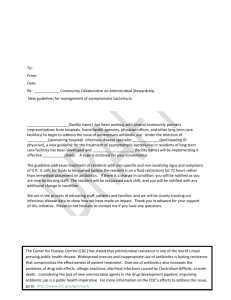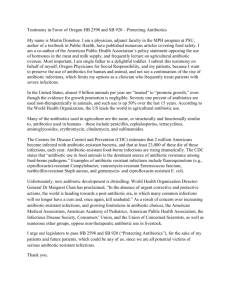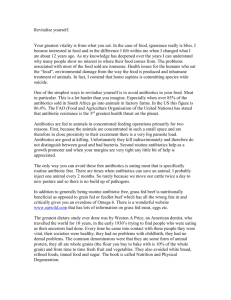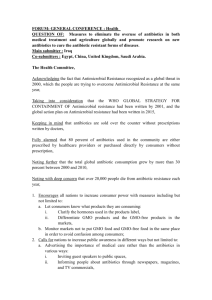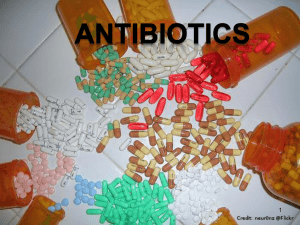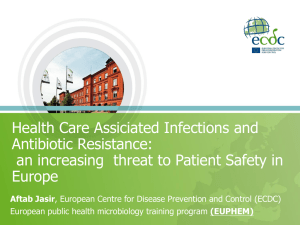highlights_28_3644135654
advertisement
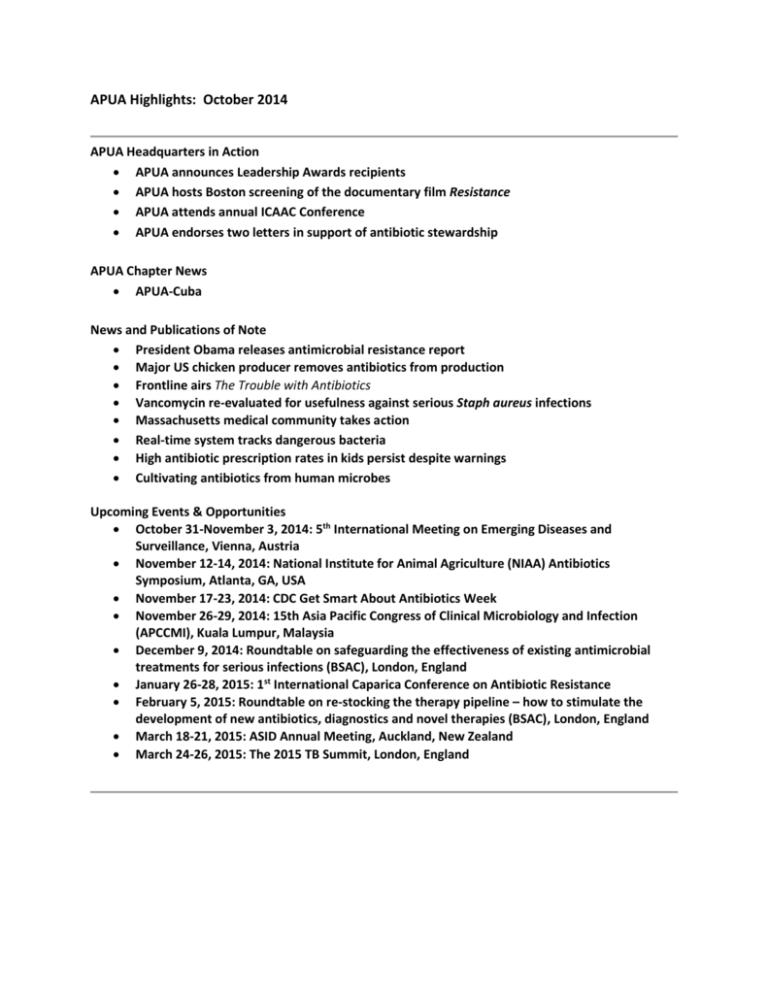
APUA Highlights: October 2014 APUA Headquarters in Action APUA announces Leadership Awards recipients APUA hosts Boston screening of the documentary film Resistance APUA attends annual ICAAC Conference APUA endorses two letters in support of antibiotic stewardship APUA Chapter News APUA-Cuba News and Publications of Note President Obama releases antimicrobial resistance report Major US chicken producer removes antibiotics from production Frontline airs The Trouble with Antibiotics Vancomycin re-evaluated for usefulness against serious Staph aureus infections Massachusetts medical community takes action Real-time system tracks dangerous bacteria High antibiotic prescription rates in kids persist despite warnings Cultivating antibiotics from human microbes Upcoming Events & Opportunities October 31-November 3, 2014: 5th International Meeting on Emerging Diseases and Surveillance, Vienna, Austria November 12-14, 2014: National Institute for Animal Agriculture (NIAA) Antibiotics Symposium, Atlanta, GA, USA November 17-23, 2014: CDC Get Smart About Antibiotics Week November 26-29, 2014: 15th Asia Pacific Congress of Clinical Microbiology and Infection (APCCMI), Kuala Lumpur, Malaysia December 9, 2014: Roundtable on safeguarding the effectiveness of existing antimicrobial treatments for serious infections (BSAC), London, England January 26-28, 2015: 1st International Caparica Conference on Antibiotic Resistance February 5, 2015: Roundtable on re-stocking the therapy pipeline – how to stimulate the development of new antibiotics, diagnostics and novel therapies (BSAC), London, England March 18-21, 2015: ASID Annual Meeting, Auckland, New Zealand March 24-26, 2015: The 2015 TB Summit, London, England APUA Headquarters in Action APUA announces Leadership Awards Recipients APUA is pleased to announce journalists and authors Maryn McKenna and John LaMattina as corecipients of the 2014 APUA Leadership Award. Maryn McKenna is a journalist for national magazines and a Senior Fellow of the Schuster Institute at Brandeis University. She is the author of Superbug and Beating Back the Devil, and is writing a book about food for National Geographic. We recognize Maryn McKenna for her tireless work in bringing the danger of growing antibiotic resistance to the attention of the public. John LaMattina is honored for his insights and writings on the process and costs of antibiotic drug development. He has been a strong advocate for a more robust FDA stance on antibiotic stewardship in agriculture and food production. In his column for Forbes, he encourages congressional incentives for new antibiotic drug development. He authored the book Devalued and Distrusted in 2013. The Chapter Award goes to APUA-Bulgaria for its diligent efforts in promoting antimicrobial resistance surveillance, antibiotic stewardship, guidelines development, and infection control. APUA extends its thanks to everyone who submitted nominations for this year’s award. The APUA Leadership Award plaque was recently spotted on national television in the background of its honoree, ABC News' Chief Health and Medical Editor Dr. Richard Besser, who was interviewed in his office on the current status of Ebola. Dr. Besser was the recipient of the award in 2005 for his work on promoting a successful antimicrobial resistance management program throughout the U.S. while serving as acting director of the CDC. APUA hosts Boston screening of the documentary film Resistance On September 25th, 2014 APUA hosted a viewing of the film Resistance, sponsored by Applegate (a 2013 APUA Honor Roll Company for responsibly limiting the use of antibiotics in its products). It was followed by a highly interactive audience discussion with APUA’s panel of experts, which included APUA vicepresident Tom O’Brien, Boston University Law Professor Kevin Outterson, Rene Russo of Cubist Pharmaceuticals, and Resistance filmmaker Michael Graziano. Resistance uses interviews, archival material, and vérité footage to untangle the web of factors behind the global crisis of antibiotic resistance. Experts and ordinary individuals who have faced this crisis firsthand reveal how our use of antibiotics has created profound challenges, not only for hospitals, but for much of modern life – from food, to governance, to personal health. With their insights, the film clarifies what’s at stake, what’s driving the problem and how we might turn the tide. APUA attends annual ICAAC Conference The APUA Headquarters team was an exhibitor at the 54th Interscience Conference on Antimicrobial Agents and Chemotherapy (ICAAC) which took place from September 5 -9 in Washington D.C. ICAAC is the premiere conference on antimicrobial agents and infectious diseases, showcasing the latestbreaking science and lectures from top researchers from around the world. APUA thanks Christopher Logan, Kathleen Young and board member, Arnold Reinhold, for their assistance in greeting visitors, fielding questions and expanding APUA’s electronic communications database. APUA endorses two letters in support of antibiotic stewardship APUA recently joined forces with multiple advocacy groups in endorsing the rising wave of antibiotic resistance awareness sweeping across the country. The first is a letter to the Administration addressed to the Honorable Secretaries in the Departments of Health and Human Services, Agriculture, and Defense. The letter applauds the efforts of the Administration’s fight against antibiotic resistance with its recent release of the National Strategy for Combating Antibiotic-Resistant Bacteria. Additionally, the letter underscores the need for further and urgent action, and extends an invitation for engagement with the various agencies on how to move forward. The second letter, addressed to Jim Perdue, Chairman of Perdue Farms, lauds Perdue for his company’s efforts in drastically cutting antibiotic use in their chicken production. The letter urges Perdue Farms to take a leadership role in the chicken production industry by sharing their best practices with other poultry producers in order to move the entire industry towards more responsible antibiotic use. APUA Chapter News APUA-Cuba In an effort to increase chapter communications, APUA-Cuba has developed a mailing list for its 1,000+ membership. Through this platform, APUA-Cuba is regularly disseminating and updating knowledge about sepsis and its consequences. Additionally, the mailing list fosters daily discussion on infectious diseases, antimicrobial resistance, and appropriate antibiotic use. The Chapter continues in its mission to decrease mortality rates due to antimicrobial resistance. APUA-Cuba was the recipient of the 2013 APUA Chapter Leadership Award. News and Publications of Note President Obama releases antimicrobial resistance report In September 2014, the President’s Council of Advisors on Science and Technology (PCAST) published a comprehensive report on antimicrobial resistance. The report, titled Combating Antibiotic Resistant Bacteria, provides a scope of the prevalence of antimicrobial resistance in the U.S. and supplies recommendations for specific action steps to be taken by key departments and agencies in order to curb the tide of resistance. Pursuant to this report, President Obama signed an Executive Order on September 18th, 2014 to actualize the recommendations made by PCAST. The Executive Order established a multipronged approach which includes a new task force for combating antibiotic-resistant bacteria, improved antibiotic stewardship, strengthened national surveillance efforts for resistant bacteria, and promotion of the development of new and next-generation antibiotics and diagnostics. Major US chicken producer removes antibiotics from production In a major victory for the fight against antibiotic resistance, Perdue Farms announced in September that it succeeded in reducing nearly all antibiotics in its chicken production over the last decade. Specifically, the company stated that they have 1) ceased using antibiotics for growth promotion or disease prevention 2) eliminated using antibiotics that are important for human medicine in 95% of its birds, and 3) stopped injecting meat chickens with antibiotics while still in the shell. Perdue began their antibiotic reduction program after receiving complaints from consumers who were concerned about antibiotics in the chickens they were buying. Information coming from the CDC, USDA, and FDA about the dangers of antibiotics in food production further spurred the company into taking steps to change its production practices. In order to compensate for the loss of the antibiotic effects, the company is switching to an all-vegetable feed that includes prebiotics and probiotics, increasing vaccinations, and cleaner chicken houses. As the third-largest chicken producer in the country, Perdue is taking this important step to drive down antibiotic use which it hopes will be the catalyst needed to reduce antibiotic misuse in animal agriculture and the food industry at large. Frontline airs The Trouble with Antibiotics On October 14, 2014 the TV program Frontline aired a documentary that examined the use of antibiotics in the food animals. The program was the second of a two-part exposé into the rise of antibioticresistant bacteria or “superbugs”. In The Trouble with Antibiotics, researchers look at the relationship between the increase in use of antibiotics in agribusiness and the meteoric rise of superbugs in humans over the last two decades. The second half examined the deadly outbreak of carbapenem-resistant Klebsiella pneumoniae that occurred at NIH’s Bethesda, MD hospital and how that dangerous and pervasive outbreak was tackled. Vancomycin re-evaluated for usefulness against serious Staph aureus infections Researchers at the University of Nebraska recently published a study on the effectiveness of vancomycin, an old-line antibiotic, in treating serious S. aureus infections. They found no difference in the mortality rates between vancomycin-treated patients with a low vancomycin MIC and those treated patients showing a high vancomycin MIC. This finding is important because it has been observed that physicians are increasingly leaning towards newer antibiotics in treating S. aureus, thereby exposing patients to unnecessary drugs that contribute to the emergence of antibiotic resistance. The study suggests that vancomycin is still effective in treating S. aureus, especially in blood stream infections, and physicians should not hesitate in using it. The findings of this study are very pertinent as S. aureus is among the most common and deadly of the healthcare -acquired infections. Massachusetts medical community takes action In late October, MASSPIRG and Consumers Union held a press conference in which it was revealed that an overwhelming majority of polled doctors (93%) express concern over the misuse of antibiotics in the meat industry. This announcement was made at Spaulding Rehabilitation Hospital in Boston which, along with Partners Healthcare and Cooley Dickinson Hospital, is part of a nationwide movement of hospitals that serve food with meats raised without non-therapeutic antibiotics. As part of the effort to raise awareness of the dangers of antibiotic overuse in animal farming, Consumers Union petitioned Trader Joe’s headquarters near Los Angeles, California to sell meat raised without routine antibiotic use. As consumer, medical, and public health organizations rally around the issue of responsibility in antibiotic use in meat production it is hoped that the Obama Administration pays heed and puts a stop to this practice for good. Real-time system tracks dangerous bacteria To add to the arsenal of remedies against drug-resistant bacteria, researchers at Johns Hopkins have developed a real-time system for tracking the progression of infection. Researchers are capitalizing on the existing technology of PET scanners to localize the epicenter of infection and track its progress, as well as the way bacteria respond to antibiotics. This technology could revolutionize the way antibiotics are used in that healthcare providers would be able to identify which antibiotic to prescribe, saving time, money and, most importantly, lives. Although the technology has only been used in mice so far, the researchers are confident that due to its simplicity, speed, and accuracy, its use in humans is imminent. The study was published in the recent issue of the journal of Science Translational Medicine. High antibiotic prescription rates in kids persist despite warnings A study conducted at the Seattle Children’s Hospital examined studies between 2001 and 2011 to evaluate antibiotic prescription rates among children. They determined that doctors are prescribing antibiotics twice as often as they are actually needed. This is in spite of warnings from regulatory bodies such as the CDC and the American Academy of Family Physicians. Lead study author, Dr. Matthew Kronman, states that viral infections such as acute bronchitis, sinusitis, and pharyngitis with a negative strep test are wrongly treated with antibiotics, which drive up resistance. He urges parents and caregivers to question their physicians when being prescribed antibiotics to determine whether or not they are really needed. Cultivating antibiotics from human microbes In addition to jungles, oceans, and the far corners of the earth, scientists can add the human body to the list of places to search for therapeutic microorganisms. In a new study published in Cell, scientists identified bacterial genes that generate molecules which may prove useful as drugs. These molecules, or “natural products”, are typically made and secreted in very small amounts by human microbes. The researchers created a software program that recognizes the gene clusters responsible for making them. When applied to the genetic library of the Human Microbiome Project, they identified over 3,000 common gene clusters with drug-producing potential. Although not all natural products are drugs themselves, researchers suggest that their molecules may be particularly good for making drugs besides just antibiotics. The fact that these natural products are made by human commensal bacteria make them even more attractive for further study. Upcoming Events & Opportunities October 31-November 3, 2014: 5th International Meeting on Emerging Diseases and Surveillance, Vienna, Austria The International Meeting on Emerging Diseases and Surveillance (IMED) is organized by the International Society for Infectious Diseases (ISID) and its Program for Monitoring Emerging Diseases (ProMED-mail). Since its inception, IMED has been a summit that unifies our approach to pathogens in the broadest ecological context. New approaches to the use of social media and data mining, novel laboratory methods, rapid point-of-care diagnostics, and public health are few of the topics that will be explored at IMED 2014. The meeting will feature a series of plenary and parallel sessions hosted by top minds of the field. Registration information can be found here. November 12-14, 2014: National Institute for Animal Agriculture (NIAA) Antibiotics Symposium, Atlanta, GA, USA Stewardship is the theme for the 2014 NIAA Antibiotics Symposium. The Symposium will focus on educating attendees about minimizing resistance and maintaining antimicrobials important for animal and human health through shared stewardship. Keynote speakers from the animal and human health communities will identify and prioritize key resistance issues at the human and animal interface, and conclude with real-world solutions for moving forward. The NIAA Symposium will consist of large and small breakout group sessions in order to foster meaningful dialogue and participation. More information about the Symposium including how to register can be found here. November 17-23, 2014: CDC Get Smart about Antibiotics Week Get Smart about Antibiotics Week is an annual one-week long program to raise awareness about the threat of antibiotic resistance and the importance of appropriate antibiotic prescribing and use. The CDC partners with various organizations ranging from government agencies and corporations to professional societies and advocacy groups. Events and activities of the week include exhibitions, press releases, and an interactive Twitter chat. Participation is encouraged and open to all. November 26-29, 2014: 15th Asia Pacific Congress of Clinical Microbiology and Infection (APCCMI), Kuala Lumpur, Malaysia Hosted by the Asia-Pacific Society of Clinical Microbiology and Infection, the 15th annual APCCMI will bring together international experts to focus on the latest developments in clinical microbiology and infectious diseases. During the conference, participants will enjoy keynote lectures, plenary sessions, oral presentations, symposia, and exhibitions in addition to social and networking opportunities. A diverse selection of speakers from around the world will share their expertise to make for a truly enriching experience. December 9, 2014: Roundtable on Safeguarding the Effectiveness of existing antimicrobial treatments for serious infections (BSAC), London, England This second installment of the 2014/2015 Roundtable Series organized by the British Society for Antimicrobial Chemotherapy (BSAC) will be a day of keynote sessions, panel discussions, networking and exhibition. Professor Dilip Nathwani, BSAC President-elect, will open with a welcome address and overview and also chair the first session which will focus on optimizing prescribing practices. The second session, chaired by Dr. Cliodna McNulty of Public Health England, will focus on better access to and use of surveillance data. The program and list of featured speakers, found here, ensures the meeting to be a success. January 26-28, 2015: 1st International Caparica Conference on Antibiotic Resistance, Lisbon, Portugal In late January 2015 the 1st International Caparica Conference on Antibiotic Resistance will be held in Lisbon, Portugal. The aim of the conference is to bring together researchers in involved in antibiotic resistance prevention and control. Some topics of focus at the conference include genetics of antimicrobial resistance, the emergence of antimicrobial resistance in animals, organizing antibiotic surveillance, policies to stimulate drug development and discovery, and control of resistant infections.. February 5, 2015: Roundtable on Re-stocking the therapy pipeline – how to stimulate the development of new antibiotics, diagnostics and novel therapies (BSAC), London, England The third, and final of the 2014/2015 Roundtable Series, will focus on two things namely 1) improving the identification of and prioritization of antimicrobial research and 2) developing new drugs, treatments and diagnostics. Sessions will feature a host of speakers from across the political, pharmaceutical, and public health fronts for a multi-sectoral meeting of the minds. The 2014/2015 Roundtable Series are delivered by BSAC in conjunction with 4AllofUs to center on the UK government’s five year antimicrobial resistance strategy published in September 2013. The ouputs of the series will be presented at a joint meeting of the All Party Parliamentary on Health in Spring of 2015. March 18-21, 2015: ASID Annual Meeting, Auckland, New Zealand The Australasian Society for Infectious Diseases (ASID) is the leading Australasian meeting for adult and pediatric infectious disease and clinical microbiology specialists. It is an ideal forum for connecting clinicians, scientists, and other health professionals with a common interest in infectious diseases for the exchange of advances in the field. The 2015 Annual Scientific Meeting boasts three speakers who will share their expertise and global perspectives on contemporary infectious diseases issues including staphylococcal and streptococcal infections, respiratory infections and infectious disease diagnostics. All of this will take place in beautiful Auckland, dubbed one of the world’s top ten travel destinations by Lonely Planet. Information regarding registration, abstract submission, and logistics can be found here. March 24-26, 2015: The 2015 TB Summit, London, England For three days in Spring 2015, global leaders in the field of TB research and treatment will come together to explore new research into TB detection, treatments and vaccination as well as new development in controlling and preventing TB infection. The summit will be hosted by Euroscicon, an organization that provides a communication link between life science research in academia and industry. Participants are urged to pre-register online here.

